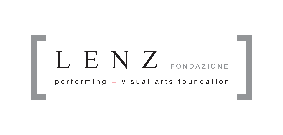
BIOGRAPHY
Lenz Foundation began its work in 2015.
Founded on the 13th of November, 2014, by the Cultural Associations Lenz Refractions and Nature Gods Theatres, the Foundation keeps up their cultural heritage (1986 for Lenz and 1996 for Natura), uninterruptedly, with the same rigors in artistic research, creation, formation, and international hospitality in the field of performing arts and sensibility, but with a wider range of artistic, cultural, and scientific planning. Lenz Fondazione obtained its acknowledgement as a Culturally Recognized Entity from the Prefecture of Parma on the 15th of January, 2015, and is listed in the register of private juridical persons. The Foundation’s artistic direction is curated by Maria Federica Masters and Francesco Pititto, the Foundation’s current President. Starting from 2021 Dr. Maria Antonioni is the new scientific director.
Lenz Foundation creates complex performative and visual contemporary projects, alongside musical and theatrical co-productions to be completed in collaboration with regional, national, and international institutions. Work shall also be made towards creating integrated workshops for people with mental, intellectual, or sensorial disabilities.
In the contemporary theatrical panorama the Lenz, with their scenic-installational grammar, their rigorous artistic practice, their one of a kind aesthetic language, and their radical expressive sense, represent a unique group for whom the word “research” continues to be the drive behind their vision. From Shakespeare to Goethe, from Ovidio to Kleist, every new dramathurgical elaboration is an authentic voyage into their view of the world, and mankind. Giuseppe Distefano – The sun 24 Ore
Büchner, Hölderlin, Lenz, Kleist, Rilke, Dostoevsky, Mayakovsky, Shakespeare, Goethe, Grimm, Andersen, Calderón de la Barca, Genet, Lorca, Bacchini, Ovidio, Virgilio, Manzoni, d'Annunzio, Dante, Euripides, Aeschylus, the Scriptures: these are the authors and the literary works that marked Lenz’s monographic and long-standing projects, starting back in 1985.
The recent projects of contemporary creative performance are the result of an in-depth artistic resarch into visual, filmic, spatial, dramathurgical and auditory arts. In a convergent aesthetic between interpretative loyalty to the script, visual radicality in filmic creation, and originality in conceptual extremism with artistic installations, Lenz’s work rewrites the philosophical tensions and aesthetic unease of the contemporary into a visionary language.
Francesco Pititto is in charge of the translation, dramathurgical reformation, and treatment of images, which is also addressed alongisde Maria Federica Maestri. The scenery and costumes are made by Maria Federica Maestri, noted by critics for her work on the “dramathurgy of matter”, and for her system of visual signs that constitute her personal “design-acted”. Andrea Azzali creates original music; an experimental musician who focuses on electronic composition, he’s also a resident artist and teacher of sound design. Lenz expresses forms of art that are recognized as some of the most original and rigorous in Italian and European theatrical research.
Their works are characterized by an unstoppable inquiry into contemporary language. In the first phase of its artistic path, Lenz has reworked the greats and classics, recapturing the poetic impulses into contemporary visions.
In recent times, the heart of poetry is a visual and malleable research: theatrical action is wedged between visual writing and the flexible creation of space, which wants to become an autonomous artistic installation. The performative action is enhanced by the exceptional nature of the actors, artistic reagents to the creative text.
Lenz has curated the artistic and organizational direction of the International Festival for contemporary creation Nature Gods Theatres since 1996. An articulate project named Theater Practices characterizes Lenz in the field of visual and theatrical formation. Social Theater Practices, on the other hand, is about the methods of theatrical, visual, and musical sensibilization, and foresees the creation of integrative workshops made to help those with intellectual or mental disabilities. In addition to this intense formative activity, there are also the workshops and activities geared towards schools and universities.
The great three-year project (2018 – 2021) The Imminent Past of Lenz Foundation is part of the dossier with which Parma won the title of Italian Capital of Culture 2020+21.
The Foundation is headquartered at Lenz Theatre, an originally industrial space of about 900 square meters, situated in the historic suburbs of Parma. It has been completely refurbished and remade into a productive contemporary headquarters – complete with two halls, offices, dressing rooms, a laboratory, and storage.
After the Municipality of Parma and the University of Parma joined Lenz Foundation as contributing members, the acquisition of Lenz Theater by the Municipality of Parma is a definite institutional recognition of the public and inclusive function of Lenz Foundation’s artistic and coaching activities.








